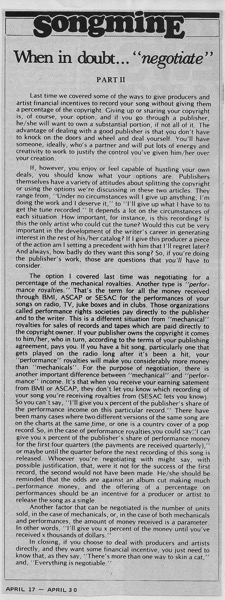A John Braheny Songmine column from the archives…

Accession Number: C000000137-030-001Document/Digital File, “Songmine: When in Doubt…”negotiate” II by John Braheny”, OCR converted text under same Accession Number
(Digitally converted text. Some errors may occur)
When in doubt… “negotiate”
PART II
Last time we covered some of the ways to give producers and artist financial incentives to record your song without giving them a percentage of the copyright. Giving up or snaring your copyright is, of course, your option, and if you go through a publisher, he/she will want to own a substantial portion, if not all of it. The advantage of dealing with a good publisher is that you don’t have to knock on the doors and wheel and deal yourself. You’ll have someone, ideally, who’s a partner and will put lots of energy and creativity to work to justify the control you’ve given him/her over your creation.
If, however, you enjoy or feel capable of hustling your own deals, you should know what your options are. Publishers themselves have a variety of attitudes about splitting the copyright or using the options we’re discussing in these two articles. They range from, “Under no circumstances will I give up anything; I’m doing the work and I deserve it,” to “I’ll give up what I have to to get the tune recorded.” It depends a lot on the circumstances of each situation. How important, for instance, is this recording? Is this the only artist who could cut the tune? Would this cut be very important in the development of the writer’s career in generating interest in the rest of his/her catalog? If I give this producer a piece of the action am I setting a precedent with him that I’ll regret later? And always, how badly do they want this song? So, if you’re doing the publisher’s work, those are questions that you’ll have to consider.
The option I covered last time was negotiating for a percentage of the mechanical royalties. Another type is “perfor-mance royalties.” That’s the term for all the money received through BMI, ASCAP or SESAC for the performances of your songs on radio, TV, juke boxes and in clubs. Those organizations called performance rights societies pay directly to the publisher and to the writer. This is a different situation from “mechanical” royalties for sales of records and tapes which are paid directly to the copyright owner. If your publisher owns the copyright it comes to him/her, who in turn, according to the terms of your publishing agreement, pays you. If you have a hit song, particularly one that gets played on the radio long after it’s been a hit, your “performance” royalties will make you considerably more money than “mechanicals”. For the purpose of negotiation, there is another important difference between “mechanical” and “perfor-mance” income. It’s that when you receive your earning satement from BMI or ASCAP, they don’t let you know which recording of your song you’re receiving royalties from (SESAC lets you know). So you can’t say, “I’ll give you x percent of the publisher’s share of the performance income on this particular record.” There have been many cases where two different versions of the same song are on the charts at the same ,time, or one is a country cover of a pop record. So, in the case of performance royalties,you could say;’,I can give you x percent of the publisher’s share of performance money for the first four quarters (the payments are received quarterly),” or maybe until the quarter before the next recording of this song is released. Whoever you’re negotiating with might say, with possible justification, that, were it not for the success of the first record, the second would not have been made. He/she should be reminded that the odds are against an album cut making much . performance money, and the offering of a percentage on performances should be an incentive for a producer or artist to release the song as a single.
Another factor that can be negotiated is the number of units sold, in the case of mechanicals, or, in the case of both mechanicals and performances, the amount of money received is a parameter. In other words, “I’ll give you x percent of the money until you’ve received x thousands of dollars.”
In closing, if you choose to deal with producers and artists directly, and they want some financial incentive, you just need to know that, as they say, “There’s more than one way to skin a cat,” and, “Everything is negotiable.”
APRIL 17 – APRIL 30
See all previous entries in the Songmine Series
About Songmine and Music Connection Magazine:
John Braheny met Eric Bettelli and Michael Dolan right before they were going to publish Music Connection magazine. Eric and Michael wanted to get their publication out to as many songwriters as they could. They had already heard of the LA Songwriters Showcase, and of John and his partner, Len Chandler. John’s goal was to advertise the schedule of guest speakers and performers at the weekly Showcase… so they made a deal.
They published John’s Songmine column (he had never before written a magazine article!) in their very first edition, in November 1977. Trading out the column for advertising, this arrangement continued for many years. Plus, Eric and Michael came to the Showcase each week and distributed free copies to the songwriters!
Those articles became so popular that (book agent and editor) Ronny Schiff offered John’s articles to F&W Media, where they became the backbone of John’s textbook, The Craft and Business of Songwriting. As a follow-up, Dan Kimpel (author, songwriter, teacher), who had also worked at LASS, took on the Songwriting column at Music Connection magazine which continues to this day! You can subscribe to get either hard copies or online.
No comments yet.